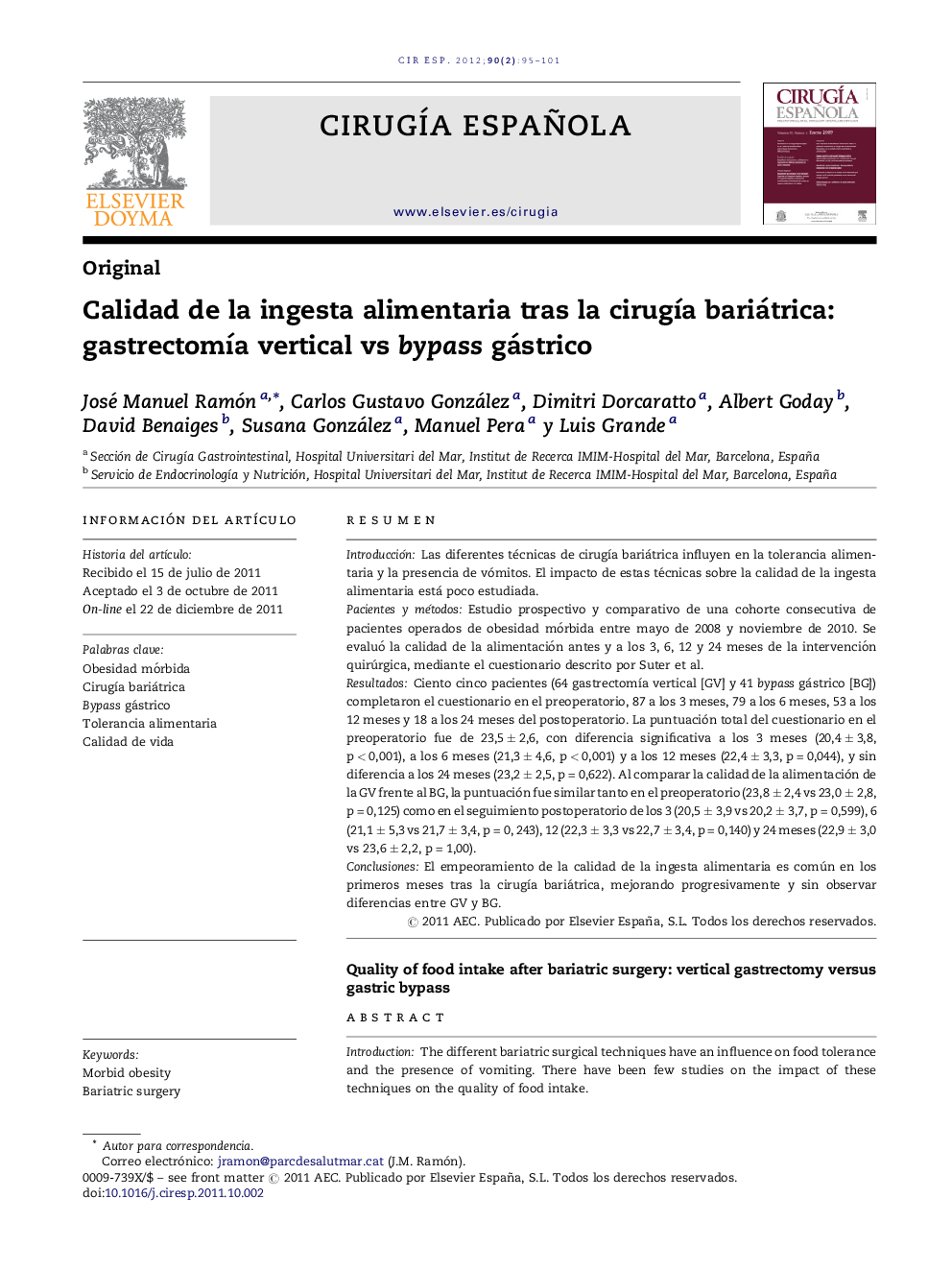| Article ID | Journal | Published Year | Pages | File Type |
|---|---|---|---|---|
| 4253089 | Cirugía Española | 2012 | 7 Pages |
ResumenIntroducciónLas diferentes técnicas de cirugía bariátrica influyen en la tolerancia alimentaria y la presencia de vómitos. El impacto de estas técnicas sobre la calidad de la ingesta alimentaria está poco estudiada.Pacientes y métodosEstudio prospectivo y comparativo de una cohorte consecutiva de pacientes operados de obesidad mórbida entre mayo de 2008 y noviembre de 2010. Se evaluó la calidad de la alimentación antes y a los 3, 6, 12 y 24 meses de la intervención quirúrgica, mediante el cuestionario descrito por Suter et al.ResultadosCiento cinco pacientes (64 gastrectomía vertical [GV] y 41 bypass gástrico [BG]) completaron el cuestionario en el preoperatorio, 87 a los 3 meses, 79 a los 6 meses, 53 a los 12 meses y 18 a los 24 meses del postoperatorio. La puntuación total del cuestionario en el preoperatorio fue de 23,5 ± 2,6, con diferencia significativa a los 3 meses (20,4 ± 3,8, p < 0,001), a los 6 meses (21,3 ± 4,6, p < 0,001) y a los 12 meses (22,4 ± 3,3, p = 0,044), y sin diferencia a los 24 meses (23,2 ± 2,5, p = 0,622). Al comparar la calidad de la alimentación de la GV frente al BG, la puntuación fue similar tanto en el preoperatorio (23,8 ± 2,4 vs 23,0 ± 2,8, p = 0,125) como en el seguimiento postoperatorio de los 3 (20,5 ± 3,9 vs 20,2 ± 3,7, p = 0,599), 6 (21,1 ± 5,3 vs 21,7 ± 3,4, p = 0, 243), 12 (22,3 ± 3,3 vs 22,7 ± 3,4, p = 0,140) y 24 meses (22,9 ± 3,0 vs 23,6 ± 2,2, p = 1,00).ConclusionesEl empeoramiento de la calidad de la ingesta alimentaria es común en los primeros meses tras la cirugía bariátrica, mejorando progresivamente y sin observar diferencias entre GV y BG.
IntroductionThe different bariatric surgical techniques have an influence on food tolerance and the presence of vomiting. There have been few studies on the impact of these techniques on the quality of food intake.Patients and methodA prospective and comparative study was performed on a consecutive patient cohort operated on due to morbid obesity between May 2008 and November 2010. The quality of the diet was evaluated before and at 3, 6, 12 and 24 months postoperatively, using the questionnaire described by Suter et al.ResultsOne hundred and five patients (64 vertical gastrectomy [VG] and 41 gastric bypass [GB]) completed the questionnaire before the surgery, and 87 at 3 months, 79 at 6 months, 53 at 12 months, and 18 at 24 months after surgery. The overall score of the questionnaire before surgery was 23.5 ± 2.6, with a significant difference at 3 months (20.4 ± 3.8, P<.001), at 6 months (21.3 ± 4.6, P<.001) and at 12 months (22.4 ± 3.3, P<.044), and with no difference at 24 months (23.2 ± 2.5, P<.622), after surgery. On comparing food intake of VG versus GB, the scores were similar before surgery (23.8 ± 2.4 vs 23.0 ± 2.8, P<.125) as well as in the post-surgical follow up at 3 months (20.5 ± 3,9 vs 20.2 ± 3.7, P<.599), 6 months (21.1 ± 5.3 vs 21.7 ± 3.4, P<.243), 12 months (22.3 ± 3.3 vs 22.7 ± 3.4, P<.140) and 24 months (22.9 ± 3.0 vs 23.6 ± 2.2, P = 1.00).ConclusionsThe worsening of the quality of food intake is common in the first months after bariatric surgery, gradually improving and with no differences being seen between VG and GB.
